Featured
Bonnie Brown: Q&A with Former Physical Plant Department Coordinator, Margaret Fields
*The latest installment in the Ole Miss Retirees features is former Physical Plant Department coordinator, Margaret Fields. The organization’s mission is to enable all of the university’s faculty and staff retirees to maintain and promote a close association with the university. It is the goal of the Ole Miss Faculty/Staff Retirees Association to maintain communication by providing opportunities to attend and participate in events and presentations.
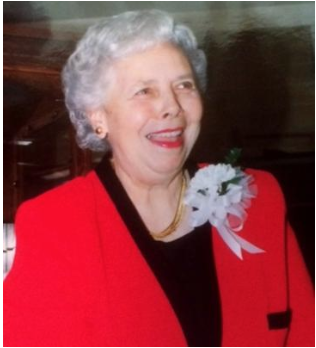
Margaret Fields (Photo by Ole Miss Photography)
Margaret Fields is a true Ole Miss icon. She coordinated the business of the Physical Plant Department (currently known as the Facilities Management Department) with a velvet glove. Ms. Fields was always willing to help and her affection for her coworkers was evident in everything she did. She is well known for her generosity and positive attitude. She doesn’t seem to have slowed down much and keeps a busy schedule. I am so honored to know her.
Brown: Where did you grow up? Where did you go to school?
Fields: My mother and daddy, Rawls and Viola Cullom, bought a little two bedroom house in Nashville after they married. I was born on Monday, Sept. 6, 1926. It was an appropriate day—Labor Day! We lived in this house for about four years. The Depression began in 1929 and my daddy had a job, but in the next couple of years he lost his job. In order to save the house, they rented it out. How about this: This two bedroom house and bathroom rented for $20 a month! We went to live with my grandparents who also lived in Nashville. It was a big house but only had three bedrooms. I slept on a couch that opened up and also held the linens. It had a round top and I never realized it was not flat. Mother and Daddy slept on the screened-in back porch. Nashville had cold winters but big bottles of hot water were there to help with those cold feet. I am not sure there was even such a thing as an electric heating pad or electric blanket.
Brown: Please talk about your childhood and family.
Fields: My father’s parents were Cricket and Ed Cullom. I thought they were the grandest two people you could ever want. After we had moved, I would beg and do most anything to stay with them and usually did. I was the only grandchild for nine years and could have been just a little spoiled. My Cricket made me mind, but I got away with most everything with Ed.
I started to first grade at Clemons School while we were living there. It was probably five blocks from home and we did walk. There were no school buses anywhere in town. I thought it was fun as I had many friends that walked with me.
Daddy would get a job and we would move near that job and I would go to the nearest school. The next school was Ross and it was terrible. There were no sidewalks, only boards to walk on to get to the building and it was rainy and muddy. He got another job and we moved again. The next school was Warner. I was about 10 when he finally got a permanent job with the Nashville Fire Department and we were back in our own home. I went to Sylvan Park School and my last school move was to Cohn High School. There was no more moving and that was my last school move. I had attended five schools in seven years.
Brown: What are some of the events in your life that made you who you are?
Fields: I had been working for Southern Bell Telephone Company in Nashville in the payroll department. Mother and Daddy moved to Mississippi so I transferred to Memphis and was a Southern Bell Telephone Company Service Representative. I had been working there about a year and the war had been going on quite some time. Buford Fields and I had gone to school together. He was a year older than me but we had corresponded the two and a half years he had been at sea. He came home on his first leave since being gone so long and the war was still going on. He did ask me to marry him and at that time we never knew how long the war might go on. He came from California on Wednesday by train to Memphis to get me. We left on the midnight train and were in Nashville on Thursday and married on Friday, July 13, 1945. We were married in his parents’ home.
There was a large Fields family and we had things planned to do and go visit sisters, aunts and uncles. They had a camp in the country and we spent some time there. From there we went to Mississippi to my parents, and Buford left from there to go back to California. The day he arrived in San Francisco the war was over. He did go back to sea and went to Japan but since the war was over he was back in September.
We moved to San Diego and lived there for 14 months. Since the war was just over it was very difficult to find a place to live. We did share a little house in Chula Vista, California with another Navy couple, later moved to National City, and finally moved to San Diego. My first child, Johnny, was born in San Diego Navy Hospital. He subsequently joined the Air Force when he was out of school.
Donna was my second child. She was born while we were living in Nashville, Tennessee. She was very young when we moved to Mississippi. She went to University High School which was on University Avenue, and was fortunate enough to attend and graduate from Ole Miss.
Brown: Tell us how/when your Ole Miss “story” began? Who hired you? How long did you work at Ole Miss?
Fields: Later we got back to Mississippi and Buford got a job in Oxford about 1952. I had not planned to work but by the time we moved to Oxford I had two children. After they both started to school I decided I wanted to work for a while. I went to the campus and took the tests. Dr. James Webb was Personnel Director. I was sent to see Mr. John White, Physical Plant Director. I went to work as Faculty and Staff Housing Secretary. I enjoyed my job on the front desk.
Assigning of housing was my main job that first 19 years. We had 110 houses and apartments to rent and at that time there was nothing to rent in Oxford. When an apartment or house was vacated, we completely renovated it. There were strict regulations for assigning a place and they did not vary. Each place was completely renovated, cleaned, and painted plus any repairs that were needed. Our shops did all of the work that was needed.
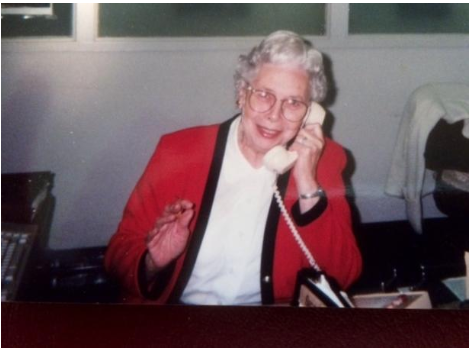
Fields at her desk at the Physical Plant Department. Photo courtesy of Margaret Fields.
Oxford was a small town then. Farmers parked their trucks around the Courthouse on Saturday and the people in town would just pull up around them and buy their vegetables and at the same time traffic was going both directions around the square. There were no parking meters and no islands.
I had worked at the front desk for 19 years. Mr. White was forever having a new secretary and that job was open again. I was happy doing what I had been doing. Mr. White came out to my desk and said he was not going to ask me one more time, would I be his secretary. I accepted and worked there another 19 years. Buford’s health had not been good for years and I decided I needed to retire. I did and we had several good years to go and do as we pleased.
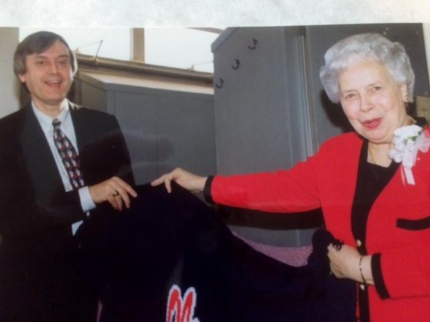
Paul Hale, Physical Plant Department Director with Mrs. Margaret Fields
on the occasion of her retirement in 1994 (Photo by Ole Miss Photography)
Brown: What position did you hold? What were your job responsibilities?
Fields: Mr. White was a wonderful person with whom to work. I don’t know how he was so nice and quiet. I think most of you know me, always chattering and enjoying almost everybody. I think that front desk was made for me. I did work hard. We had about 250 employees at Physical Plant and they were like family in many ways. During the summer the men in the shops shared their fruits and vegetables. I have put up many bags of corn, tomatoes, beans, etc. they would put in my car. It would not be just a few—I was even given a pickup truck full of corn!
The men in the shops were very good to me but also full of mischief. We never locked the office doors when we left for lunch each day. One day I was leaving work for lunch and my car exploded. It did not really explode. The men had put something under the hood to make me think it had. They were all near to watch me and my response.
We had a Physical Plant Picnic each year and it was fun. We had good attendance, delicious food, and prizes too. One year we decided to have a dunking booth. Of course, I volunteered to sit on the bench while a person would throw a ball trying to hit the target and send me into the water. One of the men couldn’t wait to be sure someone hit the lever and just ran up and pushed it to be sure I got into the tank of water. No problem, I lived across the street from the park and went home to change clothes.
Brown: You were on campus during James Meredith’s admission to Ole Miss. Talk about that experience for you.
Fields: I was working on the front desk during the time James Meredith was admitted. It was a wild time; there might be as many as ten military people in the lobby. I am afraid I was not up on the military procedure. I usually took the first person in the door and then the next one without regard as to their rank. Sorry, I found out the hard way that officers take priority.
It took a long time to get to the campus during this time. We were stopped by the soldiers on many corners in town in order to search our cars. I would have to stop as many as seven times to have my car searched and I lived in town only a short distance from campus on Williams Avenue. They also took time to check the trunk too. My daughter Donna had a broken leg with a cast to her thigh during the time James Meredith was admitted. The soldiers were kind and most of the time she was not asked to get out of the car.
I am not sure about the number but think there were about 30,000 soldiers here. We ate lunch at the cafeteria but that was not too good either. There had been tear gas in the Grove the day before and it was still strong and difficult to see.
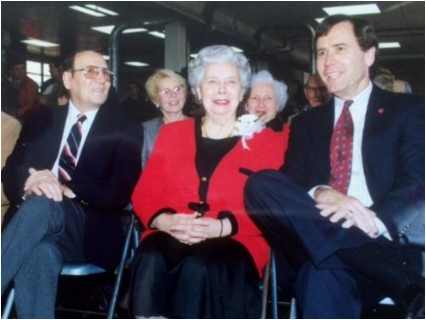
L-R, Buford Fields, Margaret Fields, and former Chancellor Gerald Turner
(Photo by Ole Miss Photography)
Brown: What became your new routine after you retired from work? Do you have hobbies?
Fields: My routine now is to get up and get dressed immediately so I will be ready if somebody wants to go or do something. I do have several things I go to on different days and go to church and Sunday School each Sunday. Saturday I manage to stay home and do things that are a must to get ready for the next week.
I don’t sew, especially if a safety pin or tape will take care of it. I do enjoy cooking and still cook for myself and goodies for others. Often I will have a cake or brownies in the freezer just in case I need or want them. I usually have some prebaked biscuits in there and bake cornbread several times a week. I keep my children supplied with biscuits. It is easy since they do freeze and keep.
I am 92 and still drive in town. I don’t mind telling my age.
My children do not live here. Donna lives in Olive Branch and Johnny lives in Germantown. I have had an emergency and had to call them. Donna packed a few things and was here in about an hour and a half, but Johnny was here sooner. They come often and any time they are really needed.
For a kid who went to five schools in seven years, the last 67 years living in Oxford and working at Ole Miss have been most enjoyable and rewarding!
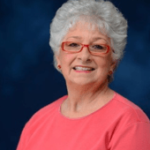 Bonnie Brown is a retired staff member of the University of Mississippi. She most recently served as Mentoring Coordinator for the Ole Miss Women’s Council for Philanthropy.
Bonnie Brown is a retired staff member of the University of Mississippi. She most recently served as Mentoring Coordinator for the Ole Miss Women’s Council for Philanthropy.
For questions or comments, email hottytoddynews@gmail.com.





























